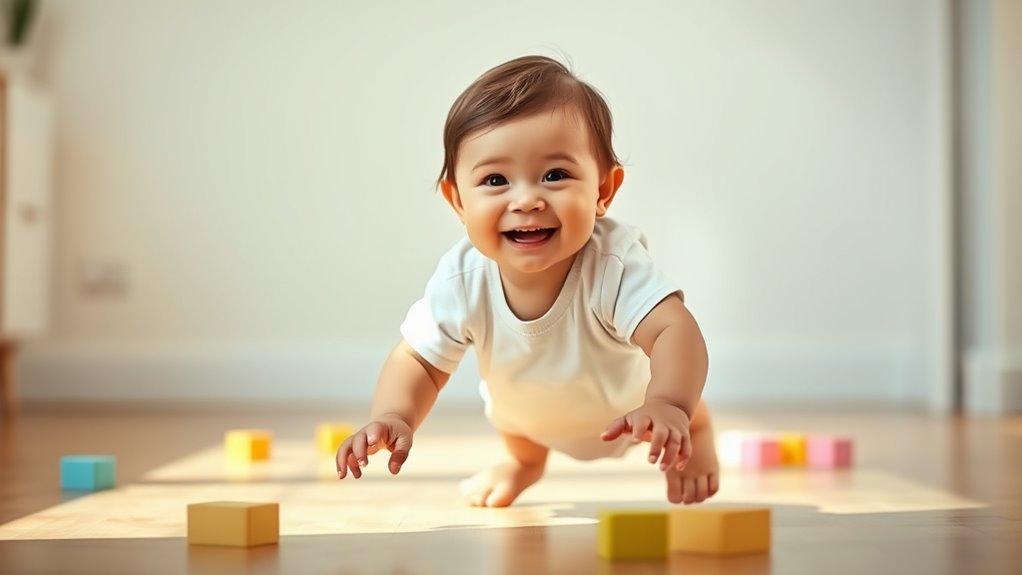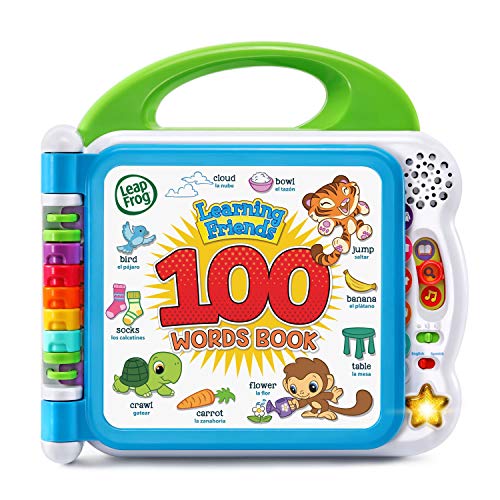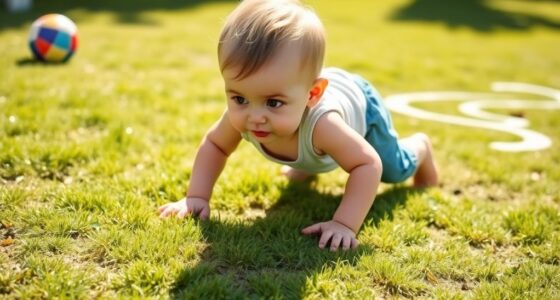Between 10 and 12 months, your baby likely takes their first steps as they gain confidence in walking, often wobbling before moving steadily. They may start saying simple words like “mama” or “dada,” using sounds intentionally. During this exciting time, their muscles, coordination, and language skills develop rapidly. With encouragement and safe spaces, you’ll see them grow more independent each day. Stay tuned to learn more about your baby’s continued milestones.
Key Takeaways
- Most babies take their first steps between 9-12 months, often wobbling before walking confidently.
- Crawling, cruising, and pulling up develop muscles essential for walking milestones.
- Babbling begins with simple sounds like “mama” and “dada,” gradually becoming meaningful words.
- Repeating sounds and responding to names foster early language development.
- Support, encouragement, and safe environments boost confidence in walking and speaking skills.

Every parent enthusiastically awaits the moment when their baby takes their first steps and begins to speak. It’s a milestone filled with excitement, pride, and a little bit of patience. Around this time, your little one is likely to shift from crawling milestones to walking, and their babbling development is turning into meaningful sounds and words. Watching these changes unfold is both thrilling and a testament to their rapidly growing abilities.
Parents eagerly await their baby’s first steps and words, marking exciting milestones of growth and independence.
By 10 to 12 months, your baby is probably mastering crawling milestones, moving with more confidence and speed. Maybe they’re crawling backwards or sideways before they move forward effortlessly. They might even be pulling up to stand and cruising along furniture, practicing their balance and strength. These crawling milestones are essential because they strengthen muscles and coordination, laying the foundation for walking. During this stage, your baby is also honing their fine motor skills—picking up small objects, passing toys from hand to hand, and exploring their environment more independently.
Simultaneously, babbling development reaches a new level. You’ll notice your baby experimenting with sounds, combining consonants and vowels, and mimicking intonations they hear daily. Their babbling might include repetitive syllables like “ba-ba” or “da-da,” which are often precursors to actual words. This vocal experimentation is a sign that they’re eager to communicate and understand language. As their babbling becomes more complex, they might respond to their name, recognize familiar words, and even imitate sounds you make. It’s a playful yet significant step toward speech.
Around this time, many babies begin to take their first steps, sometimes as early as nine months, but more commonly between 10 and 12 months. Their confidence grows with each attempt, and they might wobble before they walk steadily. Expect a mix of crawling, cruising, and now, tentative steps that gradually turn into full walking. Encouragement, safe spaces, and patience are key. Your support helps them feel secure as they explore this new mode of mobility.
During this stage, your baby’s language skills are also blossoming. They might say simple words like “mama” or “dada,” often with purpose. These words may not be perfectly pronounced, but they carry meaning. This is a sign that their babbling development is translating into real language use. Keep talking, reading, and singing with them—these interactions boost their vocabulary and confidence. Additionally, providing opportunities for exploration and safe practice can accelerate their building confidence as they learn to walk. The combination of advancing crawling milestones, babbling development, and emerging first words creates an exciting window into your child’s growing independence and communication skills. Enjoy each step of this incredible journey.

Watolt Baby Walking Harness – Handheld Kids Walker Helper – Toddler Infant Walker Harness Assistant Belt – Child Baby Walk Learning Help Support Assist Trainer Tool – for 7-24 Month Old
Say Goodbye to Backaches: Make your life easier and bid goodbye on painful backaches from leaning and bending…
As an affiliate, we earn on qualifying purchases.
As an affiliate, we earn on qualifying purchases.
Frequently Asked Questions
How Can I Encourage My Baby’s First Words?
To encourage your baby’s first words, talk to them often and use simple, clear language. Incorporate baby sign language to boost communication and understanding. Use talking toys that engage your little one and prompt interaction. Show enthusiasm and praise when they try to imitate sounds or words. Consistent interaction and positive reinforcement help your baby feel confident and motivated to start speaking.
What Are Common Signs of Developmental Delays?
They say “better safe than sorry,” so watch for signs of delays. If your baby isn’t meeting speech milestones like babbling, or struggles with motor skills such as crawling or standing, it could signal a delay. Pay attention to their responsiveness, eye contact, and coordination. If these signs persist, consult a pediatrician to guarantee proper development and early intervention if needed.
When Should I Worry About My Baby Not Crawling?
You should start to worry if your baby hasn’t begun crawling by around 12 months, as most babies reach their crawling milestones by then. Keep an eye on their baby motor skills; if they’re not showing any attempts to scoot, roll, or get on hands and knees, it could be a sign to consult a pediatrician. Early intervention can support your child’s development and help identify any underlying issues.
How Much Sleep Does a 10-12 Month Old Need?
Did you know that a 10-12 month old typically needs about 12 to 14 hours of sleep daily? During this stage, establishing consistent baby sleep routines helps, especially as they shift from multiple naps to fewer, longer ones. To ease nap transition strategies, stick to a regular schedule, create a calming environment, and be patient as your little one adjusts to their evolving sleep needs.
Are There Specific Foods to Support Speech Development?
You can support your child’s speech development by offering nutritious snacks like yogurt, soft fruits, and whole grains. Include sensory foods such as textured veggies or mashed avocado to encourage oral exploration. These foods help develop oral muscles essential for speech. Be patient and make mealtime fun, allowing your little one to experiment and learn through taste and touch, which can boost their language skills naturally.

LeapFrog Learning Friends 100 Words Book, Green
Meet learning friends Turtle, Tiger and Monkey who will introduce more than 100 age-appropriate words chosen by learning…
As an affiliate, we earn on qualifying purchases.
As an affiliate, we earn on qualifying purchases.
Conclusion
As your little one takes their first steps and says their first words, remember this is just the tip of the iceberg. Each milestone shows how quickly they’re growing and learning. Be patient and celebrate every small victory, because these moments are the foundation of a lifetime of discovery. Keep in mind, patience is a virtue—you might need it now more than ever—as your child’s journey has only just begun, and the best is yet to come.

control future Crawling Crab Baby Toy – Infant Tummy Time Toys 3 4 5 6 7 8 9 10 11 12 Babies Boy 3-6 6-12 Learning Crawl 9-12 12-18 Walking Toddler 36 Months Old Music Development 1st Birthday Gifts
Crawling Crab Baby Toy: It moving fast, skitters sideways like a real crab, and plays fun sounds and…
As an affiliate, we earn on qualifying purchases.
As an affiliate, we earn on qualifying purchases.

Imitation Book: Interactive & Fun Learn to Talk Board Book For Toddlers Ages 0-4, Written by a Speech Therapist
Learning to talk
As an affiliate, we earn on qualifying purchases.
As an affiliate, we earn on qualifying purchases.









